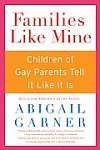Families Like Mine
reviewed by Judith E. Beckett, R.N.

by Abigail Garner
HarperCollins, 2004.
Abigail Garner was five years old when her father came out as gay and her parents separated. Brought up in gay culture, she identifies herself as a “culturally queer” heterosexual woman.
Garner, an activist and advocate for children raised by LGBT parents for the past ten years, lectures and presents workshops at colleges, businesses and conferences. She is also the creator of FamiliesLikeMine.com, a website for LGBT families.
Although Garner maintains that this is not a “how-to” book, there is plenty of advice here for gay parents. Some of it comes from her own experience and some from the more than fifty daughters and sons of LGBT parents, now in their 20’s and 30’s, that she interviews. Most of them were conceived in a heterosexual marriage before the “gaby” boom of the 80’s and 90’s with one or both of their parents later coming out.
Garner says that, contrary to what we might want to believe, our children do not turn out “just like everyone else”. The particular stressors of their growing up are not caused by their parent’s sexuality or sexual preference, however, but by the homophobia in our society.
At a young age, kids in LGBT families figure out that their family’s right to exist may depend on “how they turn out”, putting pressure on them to be perfect and to learn the “right answers”.
“Kids-of queers” in this book also have the unique experience of having had their parents come out to them as LGBT. As young children, they had to learn themselves when, how and whom to come out to in their families, schools and communities. Later, they had to come out to their parents as well (as either gay or straight).
While our children struggle with the same challenges that all children face if their parents divorce, when the divorce involves a gay or lesbian parent (or a same-sex break-up) unsettled legal issues and arbitrary rulings carry special risks. Garner offers strategies for avoiding custody battles, co-parenting successfully, and introducing a new partner into the family.
Garner says that LGBT kids soon realize that derogatory terms such as “fag” and “that’s so gay” refer to people like their parents. She explains how to prepare our “queerspawn” for the reality of homophobia before they start school. When they feel unsafe and worry about violence directed against them or their parents, how do we give them permission to talk about those things with us?
She writes: “When I ask a child of LGBT parents ‘How’s school?’ we both know I’m not asking about academics.”
Garner uses the term “family-defining moments” for those times when kinship is or is not publicly acknowledged by extended family, neighbors, company policies or laws. Straight family privilege, institutionalized homophobia, and the validation that heterosexual families automatically receive and LGBT families do not all impact the lives of children of LGBT parents.
Garner writes: “Even if we want to talk openly about our family relationships, finding the right kinship terms is a challenge.” She uses as examples the difficulty a child might have deciding how to identify her relationship with her mother’s partner’s daughter (“sort-of-a-sister”) or selecting a kinship term for a sperm donor. “We need a verbal revolution,” she says.
Garner grew up at a time when homo-hostile people were saying AIDS was a punishment for the sin of homosexuality. Garner interpreted the silence from the Reagan White House as “Gay people don’t count and we don’t care if your dad dies.” She grew up dreading the day her father would break the news to her that he was infected. (It never came).
Today there is a lot of information available about AIDS but how can HIV-infected parents talk about it with their children? Adult children in this book share their experiences dealing with their parent’s HIV-positive status or their death from AIDS. Garner explains that parents need to find support for their children around issues such as disclosure, shame, isolation, anger and sadness. Even an age-appropriate book or pamphlet can help.
Finally, children of LGBT parents sometimes feel pressure to identify as straight (“normal”) when they are “second generation” queer. Queer children and their parents often disagree on generational issues such as language and how to be open about their sexual identity. Coming out straight , on the other hand, can feel like treason and these adult children (especially men) mourn the loss of being a part of the LGBT culture where they were raised.
In the end, some of our children will “turn out” straight and some lesbian, gay, bi or transgender. Some will refuse to choose. Regardless of how they identify, they will challenge and change both mainstream culture and queer culture simply because they exist.
Information published on The Rainbow Babies website is not a substitute for proper medical advice, diagnosis, treatment or care. Always seek the advice of a physician or other qualified health providers with any questions you may have regarding a medical condition.
Disclaimer: The Rainbow Babies provides sample contracts and legal/social health articles for informational purposes only—please do not consider it as legally-binding advice of any kind.


